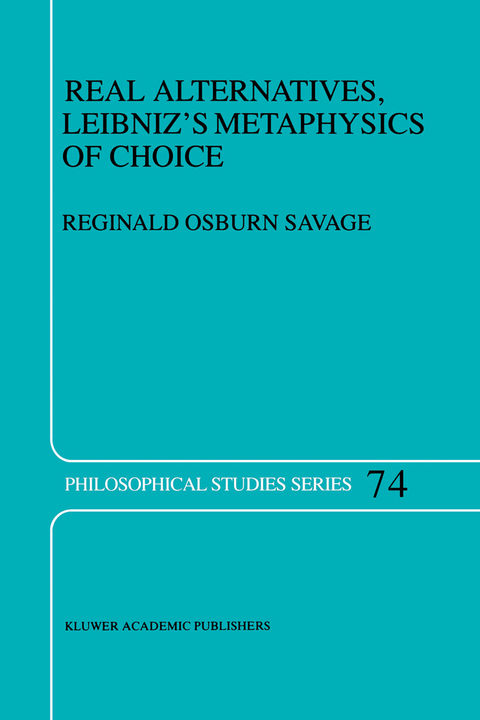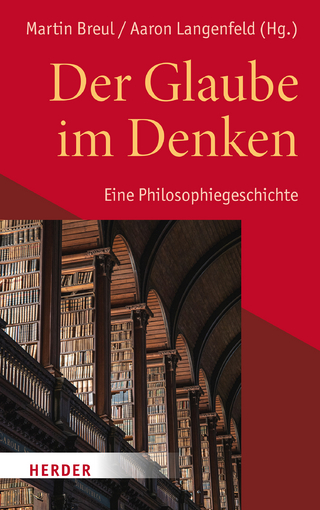
Real Alternatives, Leibniz’s Metaphysics of Choice
Springer (Verlag)
978-0-7923-5057-6 (ISBN)
In the `Preliminary Dissertation' of his Theodicy, Leibniz declares himself an apologist for the compatibilist doctrines of original sin, election and reprobation propounded by the theologians of the Augsburg Confession. According to those theologians, man's actions are determined but man retains the power to act otherwise and therefore is responsible for his actions. Savage argues that Leibniz, in formulating his apology, availed himself of both his doctrine of possible worlds and his finite-infinite analysis distinction (the latter being applied within the former). Savage challenges the dogma that Leibniz's metaphysical principles entail that individuals are powerless to act otherwise and that God cannot conceive of them acting otherwise. He argues that interpreters deduce the dogma from those principles with the aid of dubious extra-textual premises, for example, that a Leibnizian individual has only one complete concept or cannot be persons other than the person it actually is.
Notes to introduction.- One: Complete Concepts and Counterfactuals.- I. Iintroduction.- II. Complete Concepts: Purpose, Objections, and Replies.- III. Complete Concepts and Counterfactuals.- IV. Complete Concepts and Leibniz’s Metaphysics of Substance.- V. What Makes Accidents Essential?.- VI. Counterfactual Semantics, Roughly Speaking.- Notes to Chapter One.- Two: Deliberation and Counterfactuals.- I. Introduction.- II. Choice and Deliberation.- III. Counterfactual Identity and Creaturely Deliberation.- IV. The Freedom of Creatures and God’s Ideas.- V. Private Miracles?.- VI. Limited Privacy.- Notes to Chapter Two.- Three: Personal and Metaphysical Identity.- I. Introduction One: Theological Background.- II. Introduction Two: Counterfactual Identity and Indiscernibility.- III. The Identity of Indiscernibles.- IV. Personhoods and Identity.- Notes to Chapter Three.- Four: Compossibility and Creation.- I. Introduction.- II. Leibniz and Creatio ex Nihilo.- III. An Alternative reading of Leibniz on Creatio ex Nihilo.- IV. Potential Beings as Eternal Truths.- V. The Dependence of Potential Beings on God’s Mind.- VI. Perception and Relative Creation.- Notes to Chapter Four.- Five: Perceptual Incompossibility.- I. Introduction.- II. Moral Incompatibility.- III. Perceptual Incompatibility.- IV. Specific Perceptual Incompatibility.- Notes to Chapter Five.- Six: Infinite Analysis and Counterfactuals.- I. Introduction.- II. Hypothetical Necessity and the Principle of Sufficient Reason.- III. Infinite Analysis And Counterfactual Truth.- Notes to Chapter Six.- Conclusion.- Abbreviations.
| Reihe/Serie | Philosophical Studies Series ; 74 |
|---|---|
| Zusatzinfo | IX, 198 p. |
| Verlagsort | Dordrecht |
| Sprache | englisch |
| Maße | 155 x 235 mm |
| Themenwelt | Geisteswissenschaften ► Philosophie ► Geschichte der Philosophie |
| Geisteswissenschaften ► Philosophie ► Philosophie der Neuzeit | |
| ISBN-10 | 0-7923-5057-X / 079235057X |
| ISBN-13 | 978-0-7923-5057-6 / 9780792350576 |
| Zustand | Neuware |
| Haben Sie eine Frage zum Produkt? |
aus dem Bereich


